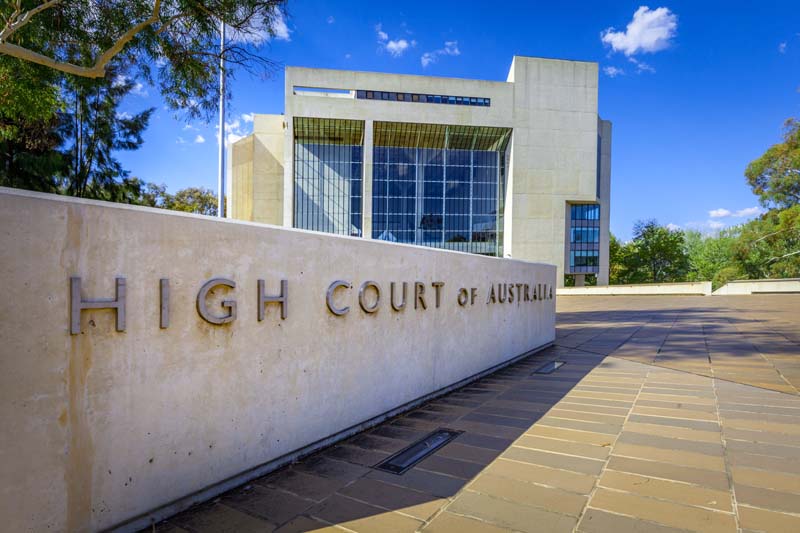The scope of the ‘aliens’ power in the Constitution

The High Court, by majority, has declined to recognise that British subjects who commenced residing permanently in Australia before the concept of Australian citizenship was created by statute on 26 January 1949 are outside the scope of the aliens power in s 51(xix) of the Constitution. In so holding, the High Court’s decision suggests that the carve out recognised in Love v Commonwealth (2020) 94 ALJR 198 – that a certain category of Aboriginal Australians is not within the reach of the aliens power – is a narrow one.
Background
Mr Chetcuti was born in 1945 in Malta, then a colony of the United Kingdom. He arrived in Australia on 31 July 1948. At the time of his arrival, he was a British subject. He became a citizen of Malta when that country became independent in 1964. He never applied for Australian citizenship. He was taken to be granted an Absorbed Person visa under amendments to the Migration Act 1958 (Cth) made in 1994.
In 1993, Mr Chetcuti was convicted of murder and sentenced to a term of imprisonment of 24 years. In 2017, the Minister for Immigration and Border Protection cancelled Mr Chetcuti’s visa pursuant to s 501(3) of the Migration Act. Mr Chetcuti was subsequently taken into immigration detention.
In June 2020, Mr Chetcuti filed a summons in the original jurisdiction of the High Court seeking a declaration that he is not an alien within the meaning of s 51(xix) of the Constitution, and therefore could not lawfully be detained or removed from Australia. Mr Chetcuti argued that he entered Australia as a British subject outside the constitutional conception of an ‘alien’, and that his ‘non-alien’ status continued as he became a subject of the Queen of Australia when the Crown divided into the Crown in right of the United Kingdom and the Crown in right of Australia (which he said occurred sometime after his arrival).
Nettle J’s decision
Somewhat unusually, at a directions hearing, Nettle J raised the possibility of his Honour hearing the case sitting alone, on the basis that the matter could be heard by him much more quickly than if it were to wait for a hearing before the Full Court. The parties did not oppose that course. His Honour heard the case on 13 November 2020 and delivered judgment on 26 November, days before his retirement on 30 November (Chetcuti v Commonwealth (2020) 95 ALJR 1).
Nettle J held that it was open to the Parliament to treat Mr Chetcuti as an alien. In summary, his Honour held that ‘[t]he absence of permanent allegiance to Australia is the essence of alienage’ (at [34]). On that basis, he said that ‘generally speaking, it is within the legislative competence of the Parliament to treat a foreign citizen, who is not an Australian citizen, as an alien’ (at [36]). Mr Chetcuti appealed Nettle J’s decision to the Full Court.
Full Court’s decision
The Full Court, by a 6:1 majority, dismissed the appeal. In a joint judgment, Kiefel CJ, Gageler, Keane and Gleeson JJ held (at [14]) that the answer to Mr Chetcuti’s case was found in the reasons of the majority in Shaw v Minister for Immigration and Multicultural Affairs (2003) 218 CLR 28. In particular, the majority affirmed the holding in Shaw that ‘the aliens power encompasses both power to determine who is and who is not to have the legal status of an alien and power to attach consequences to that status’ (at [12]; see Shaw at [2]).
In Shaw, the Court considered the status of a British subject who arrived in Australia in 1974. The majority concluded that Australia had become sufficiently independent from the United Kingdom by 1948. In that year, the Nationality and Citizenship Act 1948 (Cth) (Citizenship Act) was enacted, which created a statutory concept of Australian citizenship. On the basis that Australia had become independent at least by that date (at [20]), the majority held that the Parliament could treat British subjects who arrived in Australia after 26 January 1949 (the date the Citizenship Act commenced), and who were born outside Australia to parents who are not Australian, as aliens.
Kiefel CJ, Gageler, Keane and Gleeson JJ held that the majority’s reasoning in Shaw ‘equally supports the conclusion that the aliens power has reached all those persons who entered this country before 26 January 1949 who did not then or did not afterwards become Australian citizens’ (at [14]). Their Honours said that, in enacting the Citizenship Act, it was open to the Parliament to deny Mr Chetcuti – as a person born outside Australia whose parents were not Australian – the status of Australian citizen and thereby to treat him as an alien (at [32]).
Their Honours observed that, although Mr Chetcuti did not qualify for Australian citizenship when the Citizenship Act commenced, his position was not ‘irremediable’ (at [33]). It was open to Mr Chetcuti, as a British subject, to apply for Australian citizenship once he had resided in Australia for five years. That course was available to him until amendments to the Citizenship Act in 1973. He never did so, and thus he remained within the scope of the aliens power. Unlike Nettle J, their Honours arrived at this conclusion ‘without need to explore common law notions of allegiance and alienage’ (at [34]).

Gordon J agreed that the case was answered by Shaw (at [36]). Her Honour held that the majority’s reasoning in Shaw made it clear that Australia had become sufficiently independent by the time of Mr Chetcuti’s arrival in July 1948 (at [47]). Having said that, her Honour reiterated what she had said in Love, which was that Parliament’s power to create and define the statutory concept of citizenship does not supply the meaning of the word ‘alien’ (at [37]). In contrast to the joint judgment, Gordon J did not rule out the possibility that there might be a class of persons who arrived in Australia before 26 January 1949, who were born outside Australia to parents who were not Australian, who are not aliens (at [50]).
Edelman J agreed with the result, but by a different path of reasoning. His Honour identified the question as being whether Mr Chetcuti was an alien when he was said to fall within the application of the Migration Act, i.e., when his visa was cancelled in 2017 (at [56]). Whatever his status when he arrived in Australia, it was not ‘cryogenically frozen’– it was subject to the application of the Constitution to new political and social facts and circumstances.
Edelman J went further than both the reasoning in the joint judgment and Gordon J by offering a definition of the constitutional concept of ‘alien’. His Honour characterised the ‘essential meaning’ of the term – being the meaning that does not change over time – as ‘a foreigner to the Australian political community’ (at [53]). In his Honour’s view, the meaning of ‘alien’ does not correspond precisely with the concepts of ‘non-allegiance’ or ‘non-citizenship’ (at [60]).
Applying the essential meaning of ‘alien’ to the facts, Edelman J held that Mr Chetcuti was capable of being treated as an alien at least from 2017. That was because, as at 2017, Mr Chetcuti was born outside Australia, had no Australian parents, was not an Australian citizen and was a citizen of a foreign country (at [94]).
Steward J dissented. His Honour held that, in Shaw, the majority had identified a ‘bright line’ when the Crown in right of Australia emerged, being 26 January 1949 (at [134]). Despite expressing some misgivings about the correctness of that conclusion (at [131]), his Honour said that the decision in Shaw was ‘a necessary and convenient constitutional fiction which should not now be disturbed’ (at [134]). From that date, a British subject who arrived in Australia did so as an alien.
On that basis, Steward J held that Mr Chetcuti was not an alien when he arrived before that date (at [135]). Further, his Honour held that Mr Chetcuti did not subsequently become an alien when the Crown in right of Australia emerged six months later. At that time, Mr Chetcuti’s allegiance to the Crown in right of the United Kingdom was ‘replaced’ by an allegiance to the Crown in right of Australia (at [143]).
Australia’s independence
This case was hotly anticipated by constitutional lawyers as the occasion for the High Court to decide the date of Australia’s independence, at least insofar as the answer to that question is relevant to the aliens power. To assist the Court in identifying the relevant date, the parties prepared a special case which set out the process of Australia’s independence in what Edelman J described as ‘painstaking detail’ (at [73]).
Only Nettle J and Steward J identified a date (being 1942 and 1949 respectively). Edelman J expressly rejected the existence of any ‘magic date’ (at [73]). However, Kiefel CJ, Gageler, Keane and Gleeson JJ and Gordon J did not need to decide the issue in order to resolve the case. As a consequence, it may be that the question will never be authoritatively answered, given that the number of British subjects who arrived in Australia before 26 January 1949, and who are not citizens, will only become smaller over time.